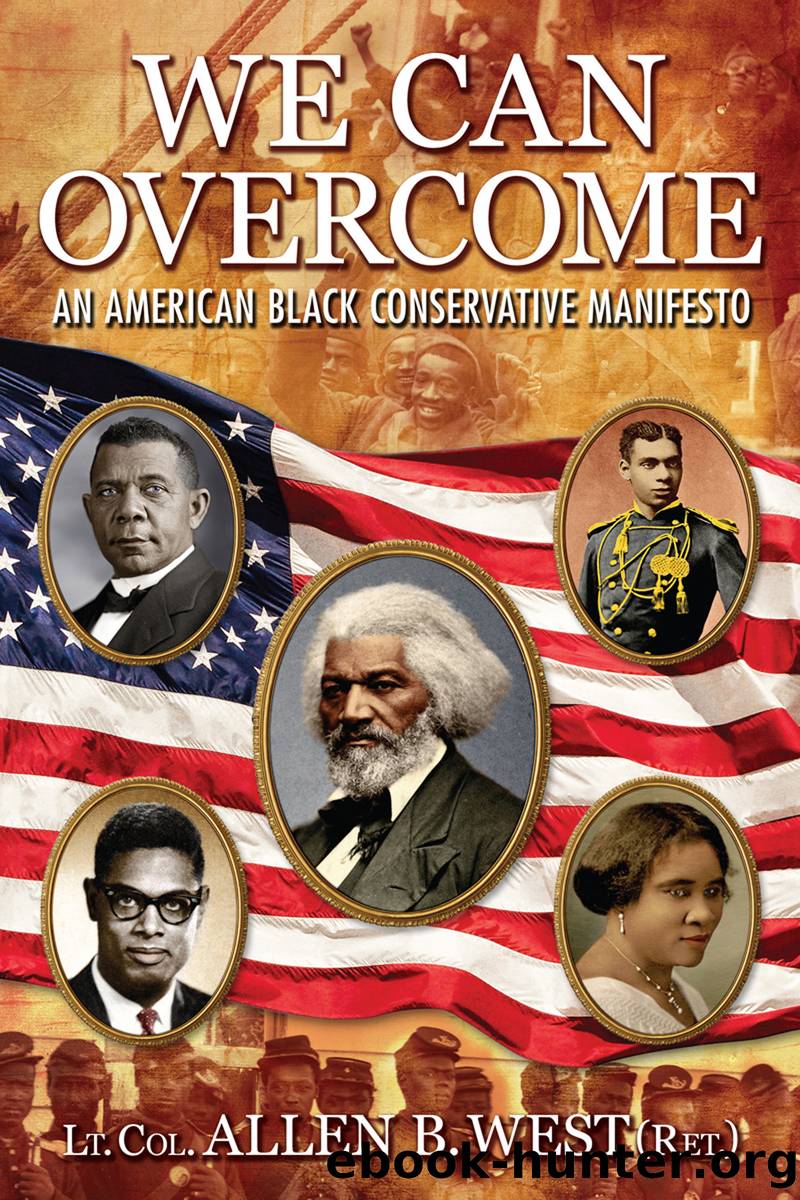We Can Overcome by Allen B. West

Author:Allen B. West [Lt. Col. Allen B. West]
Language: eng
Format: epub
ISBN: N/A
Publisher: Brown Books Publishing Group
Published: 2020-12-15T00:00:00+00:00
CHAPTER TWELVE
THE MOYNIHAN MIND-SET
I believe that many costly progressive socialist programs were started with a sincere heart. At some point, the bleedingâheart liberal policy wonks had a sudden realization of the dreadful impact of decades of discriminatory practices. Their data clearly showed rising black poverty, unemployment, juvenile delinquency, drug use, broken families, and widening educational disparities.
Chief among them was Daniel Patrick Moynihan, an assistant secretary of labor for President Johnson. Intellectual liberals like Moynihan in the early 1960s wholeheartedly believed in proactive governmental action to improve the quality of life.1 Moynihan stood out among this group after having reached success in early 1963 from producing a report titled OneâThird of a Nation, which documented the high percentages of black men in singleâparent families who failed mental and physical tests for the military draft.2 In addition, Moynihan wrote a book with Harvard sociologist Nathan Glazer titled Beyond the Melting Pot, which focused on the power of family, ethnic, racial, and religious identifications in American life.3
Moynihan was the architect behind much of President Johnsonâs War on Poverty in 1964. He felt more needed to be done to help black Americans reach a socioeconomic status equal to whites. In an April 1964 memo to Labor Secretary Willard Wirtz, Moynihan wrote: âThe Negroes are asking for unequal treatment. More seriously, it may be that without unequal treatment, there is no way for them to achieve anything like equal status in the long run.â4
The line of thinking expressed in that memo led Moynihan to write his now famous report, The Negro Family: The Case for National Action. He started the research in January of 1965. Three months and seventyâeight pages later, he was done. In March 1965, the Labor Department printed one hundred copies of his work.5
The report, which on the title page read, âFor Official Use Only,â was never intended for the general public. It was aimed at White House officials. In distributing the report, he sent a message directed at President Johnson that read, âEqual opportunity for Negroes does not produce equal resultsâbecause the Negroes today are a grievously injured people who in fair and equal competition will by and large lose out.â Later in the memo, Moynihan reminded Johnson: âYou were born poor. You were brought up poor. Yet you came of age full of ambition, energy, and ability. Because your father and mother gave it to you. The richest inheritance any child can have is a stable, loving, disciplined family life.â
The Negro Family cut to the chase in its opening line: âThe United States is approaching a new crisis in race relations.â6 Throughout the report, thereâs a steady pleading to go beyond the recently passed Civil Rights Act of 1964: âBeing Americans, they will now expect that in the near future equal opportunities for them as a group will produce roughly equal results, as compared with other groups. This is not going to happen. Nor will it happen for generations to come unless a new and special effort is made. There are two reasons.
Download
This site does not store any files on its server. We only index and link to content provided by other sites. Please contact the content providers to delete copyright contents if any and email us, we'll remove relevant links or contents immediately.
The Secret History by Donna Tartt(19096)
The Social Justice Warrior Handbook by Lisa De Pasquale(12192)
Thirteen Reasons Why by Jay Asher(8914)
This Is How You Lose Her by Junot Diaz(6890)
Weapons of Math Destruction by Cathy O'Neil(6282)
Zero to One by Peter Thiel(5805)
Beartown by Fredrik Backman(5761)
The Myth of the Strong Leader by Archie Brown(5511)
The Fire Next Time by James Baldwin(5450)
How Democracies Die by Steven Levitsky & Daniel Ziblatt(5221)
Promise Me, Dad by Joe Biden(5155)
Stone's Rules by Roger Stone(5089)
A Higher Loyalty: Truth, Lies, and Leadership by James Comey(4965)
100 Deadly Skills by Clint Emerson(4929)
Rise and Kill First by Ronen Bergman(4792)
Secrecy World by Jake Bernstein(4754)
The David Icke Guide to the Global Conspiracy (and how to end it) by David Icke(4721)
The Farm by Tom Rob Smith(4515)
The Doomsday Machine by Daniel Ellsberg(4491)
